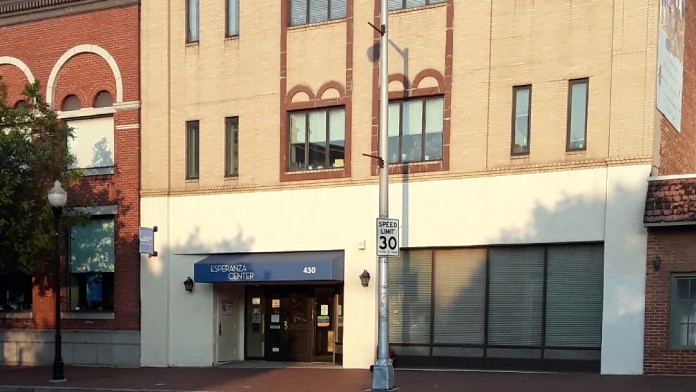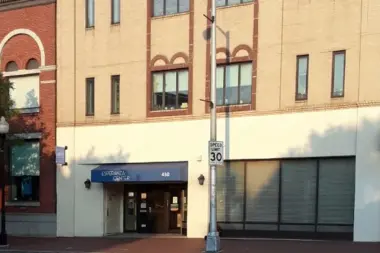They offer help in several ways very friendly areas, excellent work wonderful people they help me a lot with my rehabilitation.
About The Esperanza Center
Located in Baltimore, Maryland, the Esperanza Center has been a trusted resource for thousands of immigrants since 1963. As part of Catholic Charities of Baltimore, they provide services like legal help, health and dental care, education, and referrals to other types of community support.
Hope and Healthcare for Immigrants
The Esperanza Health Center Health Services Clinic (ECHC) is here to provide care and support for immigrants in the Baltimore area who need a helping hand. When you need health care, you’ll start at ECHC where free medical and dental services are available to immigrants who don’t qualify for government-sponsored health insurance.
The clinic operates on an appointment basis from Monday to Friday. The volunteers and staff operate collaborate with Johns Hopkins Medical Institute to provide services to clients. They provide referrals to their onsite mental health care providers
Inclusive and Compassionate Addiction Treatment
Immigrants and their families who are struggling with substance use issues and co-occurring mental health disorders don’t have to worry about where to go for help. They may not treat addiction at ECHC but they do provide referrals to Villa Maria Behavioral Health (VMBH) which is also part of Catholic Charities of Baltimore.
It doesn’t matter what religion you practice or what gender you identify as because they’ve created a nonjudgmental space where they treat everyone with dignity and respect. You are welcome here!
Helping People Heal on all Levels
They understand how mental health and substance use together can make recovery hard. That’s why they work on both at the same time. Instead of focusing on just part of the problem, they treat the whole person using a combination of therapy and medication management.
Affordable Care When You Need It
Villa Maria Behavioral Health (VMBH) accepts Medicaid and Medicare including MCHP. You can schedule appointments in person or via telehealth. They also offer a sliding scale fee to make care more affordable.
The Esperanza Center offers compassionate care and support for immigrants struggling with addiction and mental health conditions and provides referrals to Villa Maria Behavioral Health for specialized treatment.
Latest Reviews
Rehab Score
Gallery


Accepted Insurance
Other Forms of Payment
Medicaid is a state based program that helps lower-income individuals and families pay for healthcare. Medicaid covers addiction treatment so those enrolled can use their coverage to pay for rehab. When a program accepts Medicaid the client often pays very little or nothing out of their own pocket.
Private insurance refers to any kind of healthcare coverage that isn't from the state or federal government. This includes individual and family plans offered by an employer or purchased from the Insurance Marketplace. Every plan will have different requirements and out of pocket costs so be sure to get the full details before you start treatment.
Self-pay involves paying for treatment out of your own pocket. You can use savings or credit, get a personal loan, or receive help from family and friends to fund your treatment. If you don't have insurance or your insurance plan doesn't cover a specific program, self-pay can help ensure you still get the care you need.
Financial aid can take many forms. Centers may have grants or scholarships available to clients who meet eligibility requirements. Programs that receive SAMHSA grants may have financial aid available for those who need treatment as well. Grants and scholarships can help you pai for treatment without having to repay.
Medicare is a federal program that provides health insurance for those 65 and older. It also serves people under 65 with chronic and disabling health challenges. To use Medicare for addiction treatment you need to find a program that accepts Medicare and is in network with your plan. Out of pocket costs and preauthorization requirements vary, so always check with your provider.
Military members, veterans, and eligible dependents have access to specific insurance programs that help them get the care they need. TRICARE and VA insurance can help you access low cost or no cost addiction and mental health treatment. Programs that accept military insurance often have targeted treatment focused on the unique challenges military members, veterans, and their families face.
Addiction Treatments
Levels of Care
This clinic provides comprehensive outpatient psychiatric services for older adolescents and adults living in the Baltimore area. Individual, group, marital, and family therapy as well as medication management are provided by a staff of 14 full-time therapists, nurses, and attending psychiatrists. Individual treatment plans are developed according to each patient's needs.
The Chemical Dependence Unit (CDU) is a 26-bed inpatient medical unit that provides safe, medical detoxification for those addicted to alcohol, benzodiazipines and opiates. Other services offered by unit staff include health education and recovery groups (including a 12-step program), and guidance for setting up after-care.
At certain points in the recovery process, it's important to have support available 24/7. 24-hour clinical care offers a safe environment in which to recover from drug or alcohol addiction in peace, knowing medical detox and other treatment will happen with professionals on hand.
The Intensive Outpatient Program is designed to serve patients being seen by the Outpatient Clinic or patients being discharged from the psychiatry inpatient units who require a higher level of care than can be provided in regular outpatient visits. Four therapists, a nurse, an attending psychiatrist, and several psychiatric resident doctors provide medication management as well as individual and group therapy three mornings a week.
The Child and Adolescent Psychiatry Inpatient Service offers comprehensive diagnostic evaluation and treatment of children and adolescents (typical age ranges from 5-17 years old) with a variety of emotional and behavioral problems including mood disorders, anxiety disorders, psychotic disorders, severe disruptive behavior, and suicide attempts. The General Psychiatry Inpatient Unit accepts adult patients over the age of 16 on a voluntary basis only. Their expert inpatient treatment team is comprised of an attending psychiatrist, a resident psychiatrist, nurses, a social worker, a case manager, and several occupational therapists, all of whom are trained to provide of a wide range of psychiatric services to patients with diverse needs.
Intervention services helps family or friends of addicts stage an intervention, which is a meeting in which loved ones share their concerns and attempt to get an addict into treatment. Professional intervention specialists can help loved ones organize, gather, and communicate with an addict. They can guide intervention participants in describing the damage the addict's behavior is causing and that outside help is necessary to address the addiction. The ideal outcome of an intervention is for the addict to go to rehab and get the help they need.
12-step programs are addiction recovery models based on Alcoholics Anonymous (AA). A number of substance abuse programs (including some drug and alcohol rehab centers) use the 12 steps as a basis for treatment. Beginning steps involve admitting powerlessness over the addiction and creating a spiritual basis for recovery. Middle steps including making direct amends to those who've been hurt by the addiction, and the final step is to assist others in addiction recovery in the same way. 12-Step offshoots including Narcotics Anonymous (NA), Cocaine Anonymous (CA), Dual Recovery Anonymous (DRA), Sex and Love Addicts Anonymous (SLAA) and Gamblers Anonymous (GA).
Completing a drug or alcohol rehab program shouldn't spell the end of substance abuse treatment. Aftercare involves making a sustainable plan for recovery, including ongoing support. This can include sober living arrangements like halfway houses, career counseling, and setting a patient up with community programs like Alcoholics Anonymous (AA) or Narcotics Anonymous (NA).
Sober Living Houses (SLHs), aka sober homes or halfway houses, are safe, substance-free, supportive living facilities for those recovering from substance abuse. Ideal for those who've just been through inpatient or outpatient treatment, SLHs are supervised environments with rules that support sobriety, such as curfews, shared chores, and therapeutic meetings. Residents are also often trained on life skills and coping skills to make it easier to transition into society. SLHs also provide a strong sense of community that can lead to the kind of deep and lasting connections with other sober individuals that supports a new, healthy lifestyle.
Treatments
Co-Occurring Disorders in Adolescence (CODA) is a specialized treatment program designed for adolescents and young adults ages 14 to 22 who are struggling with drug and alcohol problems as well as the related mental health issues that often accompany these problems and interfere with their ability to function, whether in school, at work, at home or in social situations. Their staff includes licensed and trained masters-level clinicians and a board-certified child and adolescent psychiatrist.
Mental health rehabs focus on helping individuals recover from mental illnesses like bipolar disorder, clinical depression, anxiety disorders, schizophrenia, and more. Mental health professionals at these facilities are trained to understand and treat mental health issues, both in individual and group settings.
Programs
Adult rehab programs include therapies tailored to each client's specific needs, goals, and recovery progress. They are tailored to the specific challenges adult clients may face, including family and work pressures and commitments. From inpatient and residential treatment to various levels of outpatient services, there are many options available. Some facilities also help adults work through co-occurring conditions, like anxiety, that can accompany addiction.
Young adulthood can be an exciting, yet difficult, time of transition. Individuals in their late teens to mid-20s face unique stressors related to school, jobs, families, and social circles, which can lead to a rise in substance use. Rehab centers with dedicated young adult programs will include activities and amenities that cater to this age group, with an emphasis on specialized counseling, peer socialization, and ongoing aftercare.
Clinical Services
Cognitive Behavioral Therapy (CBT) is a therapy modality that focuses on the relationship between one's thoughts, feelings, and behaviors. It is used to establish and allow for healthy responses to thoughts and feelings (instead of unhealthy responses, like using drugs or alcohol). CBT has been proven effective for recovering addicts of all kinds, and is used to strengthen a patient's own self-awareness and ability to self-regulate. CBT allows individuals to monitor their own emotional state, become more adept at communicating with others, and manage stress without needing to engage in substance abuse.
Whether a marriage or other committed relationship, an intimate partnership is one of the most important aspects of a person's life. Drug and alcohol addiction affects both members of a couple in deep and meaningful ways, as does rehab and recovery. Couples therapy and other couples-focused treatment programs are significant parts of exploring triggers of addiction, as well as learning how to build healthy patterns to support ongoing sobriety.
Dialectical Behavior Therapy (DBT) is a modified form of Cognitive Behavioral Therapy (CBT), a treatment designed to help people understand and ultimately affect the relationship between their thoughts, feelings, and behaviors. DBT is often used for individuals who struggle with self-harm behaviors, such as self-mutilation (cutting) and suicidal thoughts, urges, or attempts. It has been proven clinically effective for those who struggle with out-of-control emotions and mental health illnesses like Borderline Personality Disorder.
Experiential therapy is a form of therapy in which clients are encouraged to surface and work through subconscious issues by engaging in real-time experiences. Experiential therapy departs from traditional talk therapy by involving the body, and having clients engage in activities, movements, and physical and emotional expression. This can involve role-play or using props (which can include other people). Experiential therapy can help people process trauma, memories, and emotion quickly, deeply, and in a lasting fashion, leading to substantial and impactful healing.
Research clearly demonstrates that recovery is far more successful and sustainable when loved ones like family members participate in rehab and substance abuse treatment. Genetic factors may be at play when it comes to drug and alcohol addiction, as well as mental health issues. Family dynamics often play a critical role in addiction triggers, and if properly educated, family members can be a strong source of support when it comes to rehabilitation.
Group therapy is any therapeutic work that happens in a group (not one-on-one). There are a number of different group therapy modalities, including support groups, experiential therapy, psycho-education, and more. Group therapy involves treatment as well as processing interaction between group members.
In individual therapy, a patient meets one-on-one with a trained psychologist or counselor. Therapy is a pivotal part of effective substance abuse treatment, as it often covers root causes of addiction, including challenges faced by the patient in their social, family, and work/school life.
Life skills trainings involve all the skills a person must have in order to function successfully in the world. These include time management, career guidance, money management, and effective communication. Truly successful addiction recovery is based on the ability to not only live substance-free, but to thrive. Life skills teaches the practical necessities of functioning in society, which sets clients up for success in life, and therefore sobriety.
Motivational Interviewing (MI) is a clinical approach to helping people with substance abuse issues and other conditions shift behavior in positive ways. It is more goal-oriented than traditional psychotherapy, as MI counselors directly attempt to get clients to consider making behavioral change (rather than wait for them to come to conclusions themselves). Its primary purpose is to resolve ambivalence and help clients become able to make healthy choices freely.
Nutrition therapy, aka medical nutrition therapy (MNT), is a way of treating physical, emotional, and medical conditions through diet. Specific dietary plans are designed by professional nutritionists or registered dietitians, and patients follow them in order to positively affect their physical and mental health.
Trauma therapy addresses traumatic incidents from a client's past that are likely affecting their present-day experience. Trauma is often one of the primary triggers and potential causes of addiction, and can stem from child sexual abuse, domestic violence, having a parent with a mental illness, losing one or both parents at a young age, teenage or adult sexual assault, or any number of other factors. The purpose of trauma therapy is to allow a patient to process trauma and move through and past it, with the help of trained and compassionate mental health professionals.
Staff & Accreditations
Staff

Bill McCarthy
Executive Director

Sarah Beckwith
CFO

Ashley Valis
COO

Jocabel Michel Reyes
Chief Development Officer

Andy Wayne
Director of Communications

Val Twanmoh
Director of Advocacy

Amy N. Collier
Director of Community Services

Mary Choplick
Director of Senior Services
Accreditations

The Joint Commission, formerly known as JCAHO, is a nonprofit organization that accredits rehab organizations and programs. Founded in 1951, the Joint Commision's mission is to improve the quality of patient care and demonstrating the quality of patient care.
Joint Commission Accreditation: Yes
Contact Information
430 South Broadway
Baltimore, MD 21231



